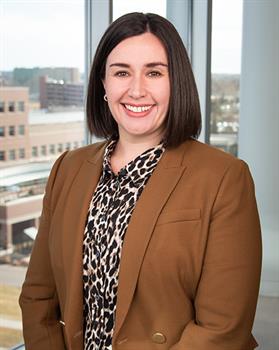Clinic Visit Q&A
Memory Disorders Clinic Director Dr. Samantha Holden explains your first clinic visit

How is the Memory Disorders Clinic at the UCHealth Central Park Medical Center connected to the University of Colorado (CU) Alzheimer’s and Cognition Center?
Dr. Samantha Holden: The Memory Disorders Clinic is the clinical base for the CU Alzheimer’s and Cognition Center. Our behavioral neurologists, neuropsychologists, advanced practice providers, and nurses provide expert, comprehensive evaluations and clinical care for people with cognitive concerns.
What do new patients need to do to be seen in the Memory Disorders Clinic?
Dr. Holden: They need to arrange a referral from their primary care physician or from the neurologist who has been seeing them. They should ask that physician to forward any records about their prior evaluation, which should include relevant blood test results and any brain imaging studies. It is also very important to know what you want from this evaluation, what questions you would like answered, and how we can best help you. Keeping track of symptoms you (or your loved ones) have been experiencing, with specific examples and a timeline of changes, is very helpful in preparation for a first visit.
What insurances does the clinic accept?
Dr. Holden: We accept all insurances accepted by the University of Colorado, which includes Medicare and Medicaid. For more information, please visit UCHealth Billing and Pricing.
What do I need to bring with me to my first visit?
Dr. Holden: In addition to the information you have prepared about your symptoms, the most important thing to bring is someone who knows you well. Having an outside view, in addition to your own internal experience, is very important to fully understanding your brain. It also helps to have another set of ears in the room to listen to the information we provide. Otherwise, any previous medical records that have not been sent in advance, especially any discs containing the images of MRIs or CTs of the brain for our personal review, should be brought in person.
What does a typical first visit look like for someone with memory concerns?
Dr. Holden: First of all, it’s important to be aware that these are long visits – usually about two hours total. We need to spend this much time with our patients so that we can start to get to know them and their brain as well as possible, as well as perform cognitive testing and neurological exams. In addition to the neurologist you are scheduled with, you may also see other clinicians, which can include medical trainees, such as medical students and resident and fellow physicians, as well as nurses, social workers, and advance practice providers. The clinicians will ask a lot of questions, all with the goal of understanding how your brain is working and if there has been a change from your previous baseline. The better we know you, the better we know your brain. Based on the information we collect from your history and examination, we may order additional testing, which may include blood work, an MRI of the brain, or more thorough cognitive testing, called neuropsychological assessments, performed by our neuropsychologist colleagues. We will discuss what we think may be going on during that first visit, but we often need this additional information for a more complete picture. It may take several weeks to obtain this additional testing after the first clinic visit, after which we have follow-up visits together to review all of this information.
A lot of people are afraid to go to a neurologist for fear they will be told they have Alzheimer's disease. How do you address that fear?
Dr. Holden: We completely understand that it can be stressful and anxiety-provoking to come and see us in clinic. But, we do want to make sure that people come and see us as soon as possible, as earlier diagnosis and treatment leads to better outcomes overall. It is vital to know as much as possible about each person’s unique situation so that we can be proactive. Even though there are no cures for the conditions we treat, there are many things we can do together to manage symptoms and potentially slow decline. Knowledge is empowering, and knowing as best we can what specific condition someone is experiencing, whether that is Alzheimer’s disease or not, will help us focus treatments, maximize quality of life, and plan well for their future. We also want to work towards destigmatizing Alzheimer’s disease and other dementias, and naming these conditions and increasing awareness will go a long way towards that goal. A related issue here is that if someone is experiencing changes in their thinking and memory, there can sometimes be associated changes in their brain’s ability to recognize these changes. This is more accurately thought of as a loss of insight, rather than denial that anything is wrong. In these situations, it can be even more difficult to convince a loved one to come into our clinic. We see these situations frequently in clinic and do all we can to make it easier for everyone.